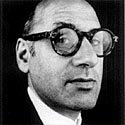| *Michael
Nyman*
(1944-) Michael Nyman is, in many ways, the prototypical overachieving baby boomer. Born in London at the very beginning of the boom, his first days were spent under a constant threat of German invasion. As a teenager, he studied music and composition at the Royal Academy of Music and at King’s College under the direction of Alan Bush and Thurston Dart. Dart specialized in English Baroque music and he introduced Nyman to the sixteenth- and seventeenth-century English canons, their use of repetition, contrapuntal lines, and classical instrumentation. In the 1960s, Nyman was disinterested in both the contemporary fads sweeping pop music and the strides being made in classical composition. Instead he turned his talents to music criticism, writing for music publications such as the Listener, New Statesman, and the Spectator. It was during this period that he is credited with coining the term “Minimalism” as it relates to music. He performed with other artists and -- like most critics -- produced a book, "Experimental Music: Cage and Beyond," in which he explored the influence of composer John Cage on a generation of performers and composers. In 1976, he accepted an invitation to arrange a number of eighteenth-century Venetian popular songs from "Il Campiello." For this gig, Nyman wrote for medieval instruments, including rebecs, sackbuts, and shawms. When the production ended, he continued to compose in the same genre in order to keep the band together. Shortly thereafter, he joined them, forming the Michael Nyman Band. Nyman finally came into his element when he was hired in 1982 to score Peter Greenaway’s film "The Draughtman’s Contract." This led to more and varied film work, though he is well known for his collaborations with Greenaway. At the same time, he continued with more traditional composition, including forays into opera, chamber music, vocal music, and dance scores. Nyman's work is characterized by his Baroque-influenced use of repetitive tones, including thumping keyboards, bass clarinets, baritone saxophones, and extreme high and low octave doublings. Many critics have also noted Mozart’s influence on much of his classical composition. In 1990 he composed a work based on the poems of Paul Celan for singer Ute Lemper, a woman he’d worked with on the score for Peter Greenaway’s "Prospero’s Books." Hot on the heels of that work, he was asked to score Jane Campion’s haunting film "The Piano," which earned him the greatest reviews of his career. It has been reported that Nyman labored obsessively over this score, inspired by the script and the film's mood to reach new emotional heights with his compositions. He continues to break new musical ground, composing music for Indian dancer and choreographer Shobana Jeyasingh, the chamber opera "The Man Who Mistook His Wife For A Hat" (based on the Oliver Sacks book), a video game, the opening of a high-speed rail link, and music to accompany runway modeling. The past few years have seen Nyman increase his output, as he composed soundtracks for "The Ogre," "The Diary of Anne Frank," "Carrington," "Gattaca" (nominated for a Golden Globe), "Practical Magic," "Wonderland," the cannibalistic black comedy "Ravenous," and most recently "The End of the Affair," which was also nominated for a Golden Globe. |
Personal Favourites ~ "The Pleasure of Your
Company"
"Gattaca" "Carrington" The Draughtsman's Contract" "The Cook, the Thief, His Wife and Her Lover" "`Prospero's Books" Links
|
